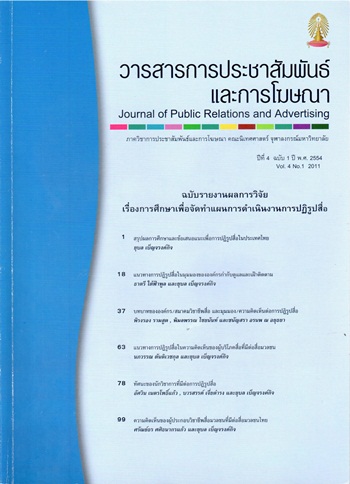แนวทางการปฏิรูปสื่อในมุมมองขององค์กรกำกับดูแลและเฝ้าติดตาม
Main Article Content
Abstract
The present study on “Opinions of Regulators and Media Watch Organizations on Media Reform” is aimed to investigate the followings: 1) opinions of regulators and media watch organizations functions and roles of traditional mass media and new media, and 2) to identify directions for structural reform administration and regulation of media system as suggested by regulators and media watch organizations. Qualitative research method of in-depth interview with purposive sampling technique was used to select 41 experts as key informants from state owned and independent regulating agencies, NGOs, political/legal sector, and business sector.
Findings show that most key informants rated media freedom in Thailand as very high especially in terms of media content. However, there still exist certain limitations regarding media ownership as a large portion of Thai media organizations were owned by the government, the military, and business interests. This then resulted in limitation of media freedom in some cases. However, several key informants voiced that most mass media in Thailand were submissive to state and business powers, and accordingly Jacked ethical integrity or courage to criticize and monitor the government and business interest groups.
As for news reporting process. the study found that content of mainstream news media were more entertainment – oriented than fact – oriented, while focusing more on violence, conflicts, obscenity and violation of human rights in order to sell their news. Moreover, news talk programs on television should not replace news reporting programs because news talk show hosts tended to add their personal views or comments to what they were presenting. Accordingly, there should be other types of news programs besides news talk, e.g. investigate news reporting precision journalism and background reporting programs that value accuracy over immediacy.
If media perform their duties with responsibility, accuracy, impartiality and adhere to professional ethics audience would not stereotype those media reporting news contradicting their own view as being enemies or adversaries. Moreover, media professionals should be guaranteed of personal safety and provided with social security or welfare for risking their lives to safeguard the public interest. It is also suggested that media organizations and professional associations should play a key role to bring this into effect. All key informants shared the same opinion that there needed to be an agency that regulates and monitors operations of mass media organizations to ensure that they perform their duties with responsibility and accountability. Even though cross – media ownership is inevitable, it is important that large media enterprises must be barred from dominating the society (media hegemony), whether it takes the form of influencing economy, creating myths or social reality or setting public agenda. Constitution of Kingdom of Thailand Year 2007 clearly states the previously - mentioned issue. As for monitoring of media performances, the study found that it was necessary and also suggested two alternatives for monitoring. First, independent agency should be established to operate media monitoring function. The other option is that concerned sectors may jointly or separately monitor how media perform their duties. Mechanism for consumer right protection could be established by encouraging more active roles of civil society in media monitoring/watching. Also, a mechanism that provides convenient and safe channels of communication through which people could file their complaints or report any misconduct of the media must be created.
Audience rating mechanism today was seen as inadequate as the system was only audience recommendation. Instead, audience rating should be combined with timeslot allocation and more channels of communication must be established to allow the audiences to voice opinions to policy makers or accrediting agency. Most key informants supported this idea, but suggested that accrediting agency must be media professional organizations or independent agency so that it is totally free from state intervention or influence. The majority of key informants said that Thai media laws currently in effect were appropriate.
However, tougher and more efficient enforcement of those Jaws should be implemented. Moreover, some Jaws needed to be amended to align with changing environments. These laws are; for example, libels, Iese majeste, emergency degree on public administration, and some acts of computer laws. At least eight recommendations can be drawn from this study. 1) Structure of media industry should be reformed by reallocating frequencies far a wider spectrum of interest groups including business, public and community sectors. 2) Review should be made to limit cross – media ownership especially among large business and transnational business groups. 3) Thai people must be equipped with media literacy through formal and informal education systems. 4) All sectors in the society should be involved in media watch/ monitoring. This could be achieved by establishing effective communication networks among media professionals, media organizations, professional associations, and policy makers of social issues and public communication. 5) Amendment of laws that obstruct exercise of media freedom is needed. 6) Thai society should retrieve value that places ethics and virtue at the highest level. 7) Public sector and media owners are to be equipped with skills in creative media production and management, and 8) Incentive – oriented accreditation is more effective than compulsory accreditation as it offers additional privileges to media professionals whose qualifications meet standards set by accrediting agency.


